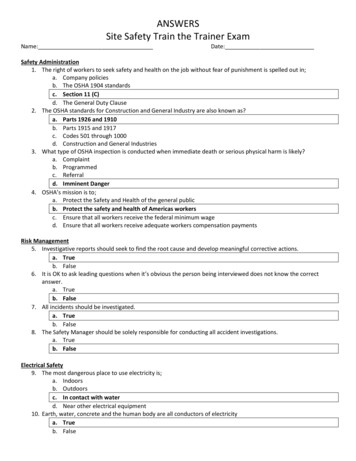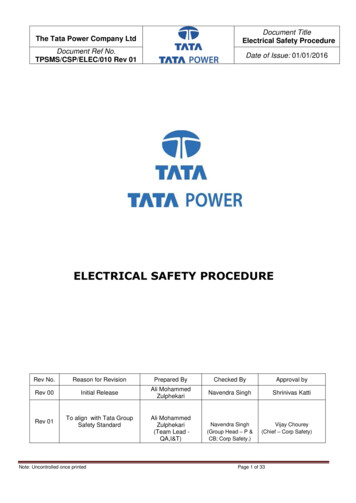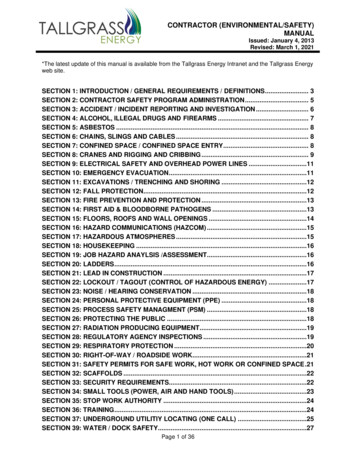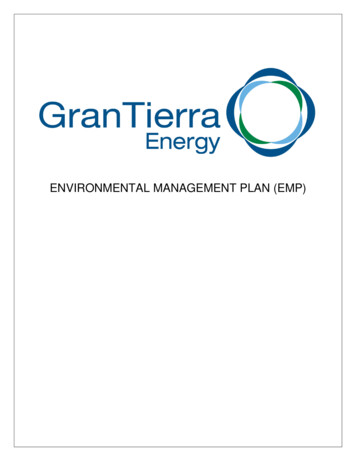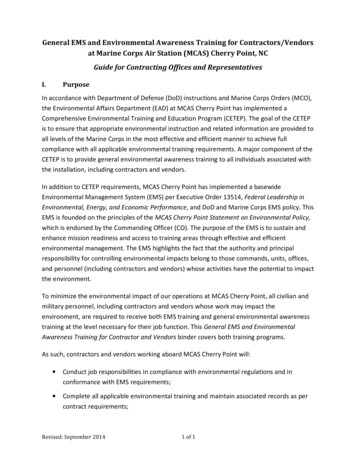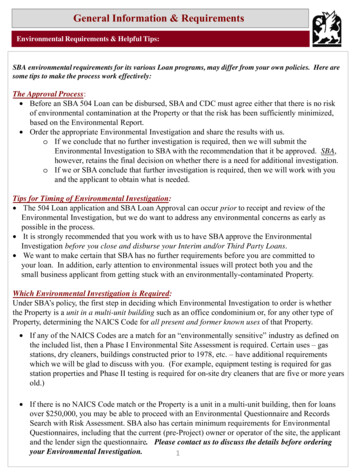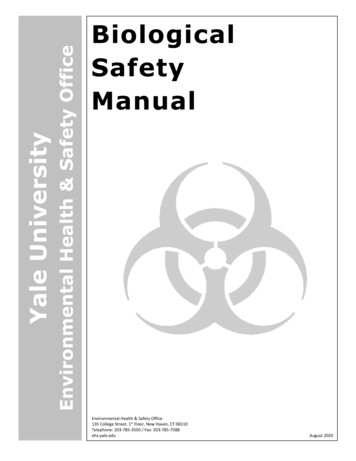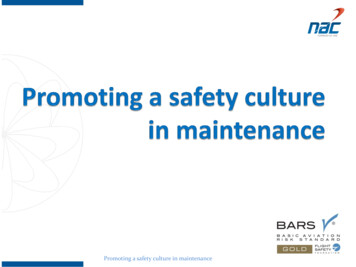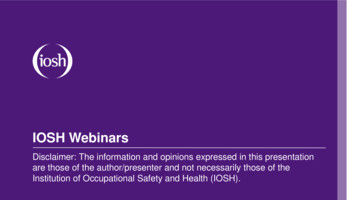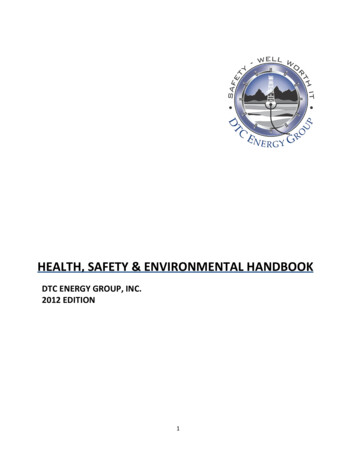
Transcription
HEALTH, SAFETY & ENVIRONMENTAL HANDBOOKDTC ENERGY GROUP, INC.2012 EDITION1
HEALTH, SAFETY & ENVIRONMENTAL HANDBOOK2012 EditionThis handbook applies to all DTC Energy Group, Inc. personneland will be referred to as the DTC Energy Group or DTCHealth, Safety & Environmental (HSE) Handbook.This handbook serves as a reference for minimum rules and standardsat DTC Energy Group operations and facilities.The guidance in this handbook is not all-inclusive.Area and local management may adopt more stringent rulesand standards to meet specific needs.Contractor rules and standards must meet or exceed the requirementsof this handbook as well as any related regulatory requirements.Compiled and revised by Robert Sylar, CEO, Luke Clausen, COO and DTC Staff forDTC Energy Group, Inc. for use while training or operating at our sites and facilities.This manual was prepared to improve safety awareness and facilitate safety training.“Leadership in safety through example”2
Table of ContentsHSE SLOGAN . 1HSE MISSION . 1HSE POLICY . 1RESPONSIBILITIES .1-3- Management .1-2- Employees . 2- Contractors .2-3SAFETY RULES . 3DRUG, ALCOHOL AND FIREARM POLICY .3-4PERSONAL PROTECTIVE EQUIPMENT (PPE).4-9- Head Protection . 5- Eye Protection. 5- Face Shields . 6- Hearing Protection . 6- Hand Protection . 6- Foot Protection .6-7- Clothing . 7- Respiratory Protection.7-8OFFICE SAFETY .8-9- Workstation ErgonomicsSAFETY STANDARDS .9-26- Confined Space Entry .9-12- Electrical Safety .12-14- Energy Isolation (Lockout/Tagout – LO/TO) .14-16- Excavating and Trenching.16-18- Fall Protection .18-22o Fall Arrest Systemso Ladder Safetyo Personnel Liftso Scaffolds1
-o Blowout Preventer (BOP) Scaffoldingo Stairso Walkway/Mud Pit Guarding & Grating/Cellar CoversPersonnel Hoisting Operations .22-23Hot Work .24-26o Cutting and WeldingTagging and Flagging . 26MOTORIZED EQUIPMENT .27-33- General Precautions .27-28- Work Zone Safety . 28- Vehicle Safety .29-30- Forklifts .30-31- Gin-Pole, Winch Truck and Crane Operations .31-32- Taglines . 32- Fuel Supply and Transfer . 33SAFE WORK PRACTICES .34-44- Back Safety/Lifting. 34- Cable, Chain, Rope and Sling Safety .34-37o Inspection Processo General Safe Working Practiceso Rigging Practiceso Shackleso Rigging of Wire Rope Clips- Compressed Gas Cylinders .37-38o Handling Cylinderso Using Cylinderso Storing Cylinders- Fire Prevention and Protection .38-40o Fire Prevention Guidelineso Fire Response Procedureso Fire Fighting Procedureso Iron Sulfide- Hand Tool and Power Tool Safety .40-42- Job Safety Analysis (JSA) .42-43- Sandblasting . 44- Severe Weather Response . 44DRILLING, WORKOVER AND WELL SERVICE SAFETY .45-57- General Precautions . 45- Rig Inspections . 45- Rig Floor Safe Practices .45-46- Raising or Lowering the Derrick/Scoping Out/In the Derrick .46-472
-Air and Hydraulic Hoist Operations .47-48Stringing up the Blocks . 48Mud Mixing Operations .48-49Mud Pump Operation and Repairs .49-50Wireline Survey Operations .50-51Slips and Elevators . 51Handling Tubular Goods . 52Drilling Under Pressure . 52Nippling Up/Nippling Down .52-53Pressure Testing . 54Top Drive Operations . 54Wireline Operations (Logging, Coring, Perforating) .54-56Fishing/Jarring Operations . 56Well Servicing & Stimulation Safety .56-57INDUSTRIAL HYGIENE PROGRAMS .58-65- Hazard Communication .58-59- Asbestos .59-60- Benzene .60-61o Tank Gauging Procedures- Hearing Conservation . 61- Heat Exposure .61-62- Hydrogen Sulfide .62-64- Lead .64-65- Naturally Occurring Radioactive Material (NORM) . 65ENVIRONMENTAL PROGRAMS .65-74- Air .65-67- Water .67-70o SPCCo Stormwatero Wetlands- Waste Management .70-73- Weed and Pest Control .73-74ONE-CALL NOTIFICATION NUMBERS . 75AGENCY INSPECTION PROCEDURES . 76INCIDENT NOTIFICATION PROCEDURE .76-773
HSE SLOGAN“SAFETY - WELL WORTH IT.”HSE MISSION To promote a corporate attitude whereby ALL personnel embrace these Health, Safety and Environmentalconcepts as their personal responsibility and their standard of excellence.To foster a culture in which HSE concerns are equally important to all other business activities.To provide a technically sound, clear, and cost-effective HSE standard for the purpose of conductingactivities in a healthy, safe and environmentally responsible manner.To improve HSE performance, while instilling the “Spirit of Compliance” in our personnel and associates.To provide the means to educate and train personnel as well as subcontractors on the jobsite.HEALTH, SAFETY AND ENVIRONMENTAL POLICYDTC Energy Group is committed to protecting people and the natural environment in all areas where it conductsbusiness. Implementation of this policy is a management value and is the responsibility of every employee.It is DTC Energy Group's policy to: Comply with all health, safety and environmental laws and regulations.Cooperate with local, state and federal agencies in their inspection and enforcement activities.Incorporate HSE considerations in the company's planning and operational decisions.Develop and communicate HSE objectives throughout the company so that all employees understand theirindividual responsibilities and are appropriately trained in carrying out these objectives.Manage operations in a responsible manner and respond effectively to avoid and/or mitigate adverse HSEimpacts associated with operations.In the event of a safety or environmental incident, report information to governmental authoritiesconcerning the situation so as to facilitate a prompt and appropriate response to potential public inquiries.Participate in the formulation of prudent and responsible HSE laws and regulations that impact operations.Foster constructive working relationships with health, safety and environmental organizations and agencies.Commit the resources needed to implement our HSE policy.RESPONSIBILITIESManagement will: Promote the concept that HSE receives equal consideration with production and profits by including HSEmetrics in annual employee performance reviews and operational goals.Strive to provide all employees with a work environment free from unsafe conditions.Require that all injuries, vehicle collisions, spills/environmental releases, near misses, fires and any otherunsafe conditions be promptly reported to supervision and investigated as warranted.Accompany injured DTC Energy Group personnel to the doctor for treatment. If management is notavailable, a DTC Energy Group HSE designate shall accompany the injured DTC Energy Group personnel.Provide employees with the appropriate tools and training to successfully complete each job safely.Ensure all employees and contractors are qualified to perform assigned job duties.1
Communicate to all employees and contract employees the DTC HSE policies and procedures.Demonstrate the level of HSE excellence expected. Lead by example.Require the use of necessary personal protective equipment (PPE) by all employees.Resolve and discuss unsafe behaviors as soon as they are observed.Analyze HSE performance when evaluating service contracts.Require routine inspections and Job Safety Analysis (JSA) to evaluate and communicate potentially unsafeconditions prior to project commencement.Conduct and/or assign and document periodic safety meetings.Employee will: Evaluate all activities before undertaking to ensure that the operation will be safe and effective.Demonstrate responsibility by actively caring for the safety of fellow workers and the general public.Stop any task/job immediately if observing an unsafe act being performed or any unsafe conditiondeveloping. There will be no retribution for any work stoppage that occurs due to HSE concerns.Report all injuries, vehicle collisions, spills/environmental releases, near misses, fires or unsafe conditionsto your supervisor immediately.Actively coordinate and participate in regularly scheduled safety meetings and training classes appropriateto the business unit and job description.Share your concerns for your personal safety or lack of prior training.Wear the required PPE according to the job description and/or task.Assist in incident investigations.Conduct Behavioral Safety Observations or Job Safety Analyses.Discuss any observed unsafe condition, behavior and/or practice with fellow workers and your supervisor.Understand and comply with all HSE rules and policies that are applicable to the location and task.Follow Standard Operating Procedures (SOP’s) and Job Safety Analyses (JSA’s) to complete each task.Advise your supervisor of all prescription medication(s) and over-the-counter medications that mayadversely affect your ability to do your job safely.Learn the location of all emergency equipment on the site and be familiar with its purpose and usefulness.Become familiar with all emergency response signals and plans.Contractor will: Evaluate all activities before undertaking to ensure that the operation will be safe and effective.Stop any task/job immediately if an unsafe act or condition is observed. There will be no retribution for anywork stoppage that occurs due to HSE concerns.Be familiar with the respective company’s and/or DTC Energy Group’s HSE requirements before startingany project on DTC facilities. Discuss the differences and special requirements of the various programs.Be responsible for the actions of employees by requiring them to be trained and follow the rules that areapplicable to the job and location.Immediately report all injuries, vehicle collisions, spills/environmental releases, near misses, fires andunsafe conditions to the DTC Energy Group Supervisor.Hold pre-job safety meetings to discuss the project and anticipate HSE issues. Additionally, regular safetymeetings will be conducted to review the project’s progress and HSE issues.Actively participate in crew pre-job safety meetings and review of Job Safety Analysis (JSA) notinghazards specific to working with third party equipment and personnel.Provide proof of training or other HSE documentation upon request.Conduct and document incident investigations and implement corrective measures.Participate in HSE reviews.Gain approval and/or appropriate training before operating equipment.Ensure equipment is maintained in a safe working condition and properly rigged prior to the start of anyoperation.2
Provide MSDS’s for all chemicals brought to any work site to the DTC Supervisor.Clean-up work areas upon completion of job. Dispose of garbage in an environmentally sound manner.SAFETY RULES DTC Energy Group will enforce compliance of HSE policies and practices.Report all injuries, vehicle collisions, spills/environmental releases, near misses, fires, unsafe conditionsand unsafe work practices to management.Hold a pre-job safety meeting to review procedures, equipment locations and emergency plans. Ensure allrequired PPE and safety and emergency equipment is readily accessible for the project.Seat belts are required for all occupants during the operation of any vehicle used for Company business.It is the driver’s responsibility to require that everyone fastens their seat belt before moving the vehicle.Use handrails when ascending or descending stairways.Operation of equipment having a “DANGER – DO NOT OPERATE” or similar warning tag is prohibited.Under normal operations, all operating machinery and electrical switchgear is required to have all safetyguards, switches and alarms in place and functional. Lockout-Tagout controls are required if safeguards areto be bypassed in accordance with the DTC-Energy Isolation Program.All isolation valves upstream of pressure relief valves must be locked or sealed open.Finger rings, loose clothing, unsecured long hair (below collar), watches and other loose accessories shallnot be worn while operating electrical equipment, while climbing ladders or when within an arm’s length ofrotating machinery .Always use proper tools and equipment for the job. Do not use damaged or incorrect tools to perform thetask. Damaged tools are to be replaced, repaired or discarded.Erect barricades, flags or barricade tape around areas of hazardous work, holes, floor openings, overheadwork zones and exposed energized circuits. Overhead protection may also be utilized when applicable.Excavations must be flagged, fenced or secured when left unattended.Fire extinguishers, eyewash stations and self-contained breathing apparatuses should be inspected monthlyor as required. Alarm boxes, fire doors, First Aid kits and all other emergency equipment must be wellmaintained and readily accessible.Smoking on Company premises is restricted to designated areas only. Smoking is not permitted in anybuilding or enclosed structure intended for personnel occupancy.No smoking within 150 feet of any well, wellhead, tank battery, oil transfer pump, production facility orother area where combustible, flammable vapors or liquids could reasonably exist.Do not walk or stand on storage tanks or piping unless they are equipped with properly designed walkwaysand fall protection barriers. Never jump from one to the other!Never stand in the "Line of Fire" when opening potentially pressured equipment such as piglaunchers/receivers, bull plugs, valves, presses, etc.Non-intrinsically safe electrical equipment such as cell phones, pagers, cameras and laptop computers, etc.,are not to be brought into Class I Division II areas (As defined by the National Electric Code) unlesscleared by the Hot Work Permitting process.Do not use an air hose to blow particles off of clothing, hair or skin.Personnel and contractors will follow applicable sections of the Manual for Uniform Traffic ControlDevices (MUTCD) to protect both workers and the public when DTC activities impact traffic flow onpublic roads.DRUG, ALCOHOL AND FIREARM POLICYIt is the employee’s responsibility to be familiar and comply with the Drug, Alcohol and Firearm Policy specific tothe individual’s respective assignment.3
This policy is the minimum standard for all employees, contractors and vendors working for DTC Energy Group. Work-related consumption of alcohol or illegal drugs is prohibited! Therefore the use, possession,concealment, sale, transportation, promotion, purchase, distribution, or testing positive for alcohol or drugswhile working on Company premises, or in Company or hired vehicles, is prohibited and subjects theemployee in violation to discharge. As a condition of YOUR employment, each employee has the responsibility to be knowledgeable of theDrug, Alcohol and Firearm Policy and to fully comply with the provisions of the plan. The Company mayrequire an employee to take a test to determine the presence of drugs or alcohol. An employee’s refusal tosubmit to such a test is considered a presumption that the employee would have tested positive. An employee indicted for a criminal drug or alcohol offense must notify the Company of that fact withinfive days of the incident. A conviction from the court must be reported immediately and will result indisciplinary action up to and including discharge. Failure to report incidents will result in similar action. Employees taking prescription medications or over-the-counter medications will inform their supervisor ofthis fact and of any side effects or warnings associated with taking the medication(s). These side effectsmay result in the employee being relieved of their duties until they have completed taking the medication. Prescriptions must be in the name of the employee possessing the medication. Otherwise this will result indisciplinary action up to and including discharge. Prescriptions are not to be shared at the work place. Personnel found possessing any firearms, weapons, ammunition, drugs, or alcohol on company propertywill be subject to being removed from the job site, and face disciplinary action up and including discharge. Personnel emitting a strong odor of alcohol will be assumed to be intoxicated, dismissed immediately andwill have provided DTC grounds for breath and other testing. The Company may conduct searches and inspections for unauthorized items for any reason at any time.PERSONAL PROTECTIVE EQUIPMENTThe following rules identify required personal protective equipment for ALL personnel including contractors.Loaner equipment may be provided for visitors at the location. The DTC onsite job representative should beconsulted in advance to determine need and availability.Additional information can be found in 29 CFR 1910.132 Subpart I.General Guidelines DTC Energy Group will provide non-prescription safety glasses, hardhats, and hearing protection to DTCemployees. DTC will provide FRC apparel as required by client’s contract and OSHA regulation. All personal protective equipment (PPE) must meet applicable standards established by recognizedgovernmental and/or industry groups.4
Personnel handling chemicals or other agents must wear proper eye or face protection, respiratoryprotection, gloves and aprons. Employees are responsible for the proper use, cleaning and storage of theirassigned PPE. Rubber gloves, rubber apron and chemical goggles will be worn when handling chemicals or hazardousmaterials such as acids, caustic soda and soda ash. Adequate training is required prior to handling thesematerials.Head Protection(29 CFR 1910.135 and MSHA Part 56.15002) Approved hardhats are to be worn in field operations and other designated areas. Newly acquired hardhats shall meet the minimum requirements set forth by ANSI Z89.1 1997 (Type 1 or 2– Class E Hardhats). No modifications or alterations of the shell or support harness are permitted. Hardhats must be worn asdesigned, specifically bill forward and level. No ball caps, hoods or similar head covering under thesuspension will be allowed. Winter linings are approved and should be installed so as not to interfere withthe suspension as designed. Hardhats will not be painted. Name, title and appropriate safety stickers are allowed.Eye Protection(29 CFR 1910.133 and MSHA Part 56.15004) Safety eyewear must meet or exceed ANSI Z87.1 and be worn during field operations or as designated. ANSI approved eyewear is to be worn over non-ANSI approved eyewear or those not having side shields. Avoid the use of contact lenses while working with chemicals. If contact lenses are worn, specialprecautions such as wearing goggles must be taken. Dark-tinted glasses specifically designed for cutting will be worn by the welder at all times when using anoxygen-acetylene torch. Dark-shaded safety glasses are not an acceptable alternative. Welding helmets fitted with #10 filtered lenses will be worn by the welder. The welder’s fire-watch orwork assistant will wear welders #5 filtered cutting lenses at all times when electric arc welding. Splash-proof chemical goggles will be worn when handling hazardous chemicals liquids or powders, orwhen exposed to chemical fumes. Examples include: cleaning with chemical solutions or solvents, or whilehandling or mixing chemicals.5
Face Shields(29 CFR 1910.133 and MSHA Part 56.15014) Face Shields will be worn over safety glasses anytime there is exposure or flying debris or splashingparticles. Examples:- Changing tong dies- Hammering on high-tensile steel (like chain links)- Using bench grinders or portable disk grinders- Chipping, filing, buffing- Spraying with a high-pressure paint or water gun Although face shield fogging is a known problem, employees areexpected to stop the activity, clean the face-shield and then continue on withthe activity. Fogging does not relieve the employee of the responsibility for wearing the full face shieldwhen appropriate.Hearing Protection(29 CFR 1910.95 and MSHA Part 62.160) Hearing protection must be worn in designated high-noise areas. (85 dBA or higher). If the high-noise area is determined to be 115 dBA or higher, dual protection (inserts and muffs) shall beworn.Hand Protection(29 CFR 1910.138 and MSHA Parts 56.15006 and 15007) Personnel must wear hand protection appropriate for the task when performing work that may cause injuryto the hands. An example would be wearing rubber gloves when handling caustic soda, acids, soda ash andlime. Electrical lineman’s gloves are to be worn when working on energized electrical equipment that exposesthe employee to voltages greater than 50 VAC, except during diagnost
HEALTH, SAFETY & ENVIRONMENTAL HANDBOOK 2012 Edition This handbook applies to all DTC Energy Group, Inc. personnel and will be referred to as the DTC Energy Group or DTC Health, Safety & Environmental (HSE) Handbook. This handbook serves as a reference for minimum rules and
